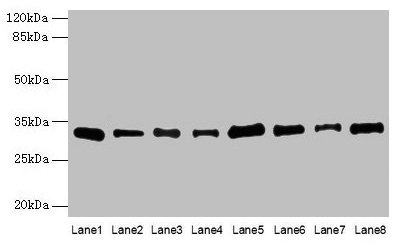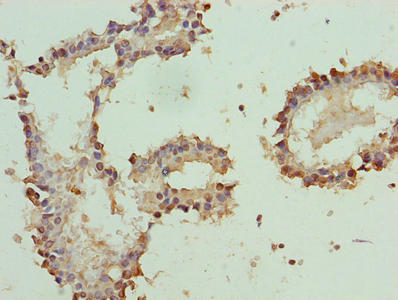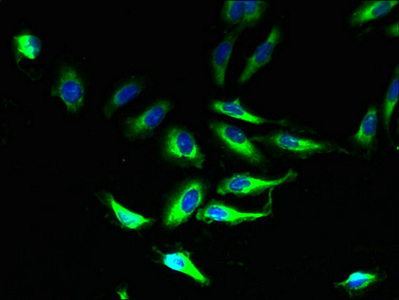PLP1 Antibody
-
货号:CSB-PA018202LA01HU
-
规格:¥440
-
促销:
-
图片:
-
Western blot
All lanes: PLP1 antibody at 4µg/ml
Lane 1: Hela whole cell lysate
Lane 2: HL60 whole cell lysate
Lane 3: K562 whole cell lysate
Lane 4: THP-1 whole cell lysate
Lane 5: U937 whole cell lysate
Lane 6: A549 whole cell lysate
Lane 7: Caco-2 whole cell lysate
Lane 8: HepG2 whole cell lysate
Secondary
Goat polyclonal to rabbit IgG at 1/10000 dilution
Predicted band size: 31, 27 kDa
Observed band size: 31 kDa -
Immunohistochemistry of paraffin-embedded human breast cancer using CSB-PA018202LA01HU at dilution of 1:100
-
Immunofluorescent analysis of Hela cells using CSB-PA018202LA01HU at dilution of 1:100 and Alexa Fluor 488-congugated AffiniPure Goat Anti-Rabbit IgG(H+L)
-
-
其他:
产品详情
-
产品名称:Rabbit anti-Homo sapiens (Human) PLP1 Polyclonal antibody
-
Uniprot No.:P60201
-
基因名:PLP1
-
别名:PLP1; PLP; Myelin proteolipid protein; Lipophilin
-
宿主:Rabbit
-
反应种属:Human
-
免疫原:Recombinant Human Myelin proteolipid protein (143-197AA)
-
免疫原种属:Homo sapiens (Human)
-
标记方式:Non-conjugated
本页面中的产品,PLP1 Antibody (CSB-PA018202LA01HU),的标记方式是Non-conjugated。对于PLP1 Antibody,我们还提供其他标记。见下表:
-
克隆类型:Polyclonal
-
抗体亚型:IgG
-
纯化方式:>95%, Protein G purified
-
浓度:It differs from different batches. Please contact us to confirm it.
-
保存缓冲液:Preservative: 0.03% Proclin 300
Constituents: 50% Glycerol, 0.01M PBS, PH 7.4 -
产品提供形式:Liquid
-
应用范围:ELISA, WB, IHC, IF
-
推荐稀释比:
Application Recommended Dilution WB 1:500-1:2000 IHC 1:20-1:200 IF 1:50-1:200 -
Protocols:
-
储存条件:Upon receipt, store at -20°C or -80°C. Avoid repeated freeze.
-
货期:Basically, we can dispatch the products out in 1-3 working days after receiving your orders. Delivery time maybe differs from different purchasing way or location, please kindly consult your local distributors for specific delivery time.
相关产品
靶点详情
-
功能:This is the major myelin protein from the central nervous system. It plays an important role in the formation or maintenance of the multilamellar structure of myelin.
-
基因功能参考文献:
- three single nucleotide polymorphisms in PLP1 that were associated with interhemispheric integration via the corpus callosum in a previous study also are relevant for functional hemispheric asymmetries. PMID: 29435918
- This study demonstrated that the plp and alpha-synuclein transgenic mouse model of multiple system atrophy showed the Progressive striatonigral degeneration. PMID: 29298733
- Pelizaeus-Merzbacher disease (PMD) is an X-linked disorder caused by mutations in the PLP1 gene, which encodes the proteolipid protein of myelinating oligodendroglia. PMID: 29478609
- Proteolipid protein 1 and contactin 1 gene variation modulates interhemispheric integration PMID: 27864734
- Using whole exome sequencing, a novel pathogenic PLP1 missense mutation c.251C > A (p.Ala84Asp) was detected in a Moroccan family, allowing a diagnosis of Pelizaeus-Merzbacher Disease. PMID: 29486744
- down-regulated in cord blood by prenatal smoking PMID: 28130959
- s investigated the disease progression in mouse models carrying PLP1 point mutations previously found in patients displaying clinical features of multiple sclerosis. These mouse models show loss-of-function of PLP1 associated with neuroinflammation. PMID: 28173160
- Review focusing on sequences in hPLP1 intron 1 DNA deemed important for hPLP1 gene activity as well as a couple of "human-specific" supplementary exons within the first intron which are utilized to generate novel splice variants, and the potential role that these sequences may play in PLP1-linked disorders. PMID: 28735559
- it seems that the epitopes of some microorganisms mimicking PLP such as PLP58-74 might have a potential role in the initiation of Multiple Sclerosis. PMID: 27917626
- Human induced pluripotent stem cells-derived oligodendrocytes from 12 individuals with Pelizaeus-Merzbacher and identified individual and shared defects in PLP1 mRNA expression and splicing, oligodendrocyte progenitor development, and oligodendrocyte morphology and capacity for myelination. PMID: 28366443
- report a novel mutation of the PLP1 gene in two siblings with Pelizaeus-Merzbacher disease associated with a rare and protean neuroimaging finding of optic nerve enlargement PMID: 27793435
- Identification and functional study of novel PLP1 mutations in Chinese patients with Pelizaeus-Merzbacher disease. We identified PLP1 mutations in seven male patients with PMD. PMID: 25491635
- In major depressive disorder there was a significantly reduced expression of PLP1 mRNA. PMID: 25930075
- Study investigated 17 unrelated Pelizaeus-Merzbacher disease subjects with copy number gains at the PLP1 locus including triplication and quadruplication of specific genomic intervals-16/17 were found to have a duplication-inverted triplication-duplication rearrangement product. PMID: 25749076
- Myelin proteolipid protein is critical to regulating oligodendrocyte progenitor cell migration. PMID: 26311781
- PLP1 splicing mutations may result in a wide variety of disease phenotypes through a combination of multiple molecular pathogenic mechanisms. PMID: 23771846
- this study provides new insight into the genotype-phenotype correlations of patients with PLP1 splice-site mutations. PMID: 23711321
- Insertion of an extra copy of Xq22.2 into 1p36 results in functional duplication of the PLP1 gene in a girl with classical Pelizaeus-Merzbacher disease. PMID: 26329556
- Data strongly suggest that a secondary structure within intron 3 is important for controlling regulation of the PLP1 alternative splice and that patient mutations can cause Pelizaeus-Merzbacher disease by disrupting this structure. PMID: 24890387
- Mutations found in the PLP1 gene are the cause of PMD in around 20% of the patients in this series. PMID: 23347225
- Data suggest transmembrane segment of PLP contains multiple helix-helix interaction motifs that play role in ability of PLP to form dimers/oligomers; alteration of local hydrophobicity affects both helix-helix interaction and segment alpha-helicity. PMID: 24857611
- show that the presence of the c.436C>G mutation served to introduce regulatory motifs that appear to be responsible for the perturbed splicing pattern that led to loss of the major PLP transcript PMID: 24019930
- Our clinical and molecular findings showed that the phenotypic spectrum resulting from PLP1 mutations seems to be broader in patients with the PLP1 gene duplication compared to patients with both nonsense and missense mutation. PMID: 24519770
- report a novel PLP1 missense mutation (c.88G>C) in a family from Argentina. This mutation is in a highly conserved transmembrane domain of PLP1 and the mutant protein was found to be retained in the endoplasmic reticulum when expressed in vitro PMID: 24103481
- data show that complex duplications involving PLP1 are not uncommon, can be detected at the level of genome resolution afforded by clinical aCGH and duplication and inversion can be produced in the same event. PMID: 21623770
- The PLP1 gene has a more complex role in human brain development, exceeding its structural function in myelin formation. PMID: 22511562
- PLP1 mutants inhibit Golgi apparatus to endoplasmic reticulum trafficking and have a role in pathogenesis of Pelizaeus-Merzbacher disease PMID: 23344956
- In transfected cells, oligodendrocytes & brain, PLP exists as a monomer or a disulfide-linked dimer via Cys108. Isoform DM20 is usually a monomer. Mutants causing Pelizaeus-Merzbacher disease form disulfide-linked, high-MW aggregates. PMID: 22902553
- the underlying effect of the partial PLP1 duplication identified in this study was different from other PLP1 alterations including a typical duplication and a missense mutation. PMID: 22695888
- expression of PLP1 in oligodendrocytes markedly inhibits their differentiation, and that this inhibitory effect is effectively improved by inhibition of extracellular signal-regulated kinase activity. PMID: 22750001
- A novel PLP1 mutation was found in a family presenting with X-linked recessive Hereditary Spastic Paraplegia. PMID: 22343157
- Inflammation in mammals with increased Plp1 gene dosage may also contribute to axonal degeneration described in patients and transgenic rodents with PLP1 increased gene dosage. PMID: 20885931
- Data suggest that a defective disulfide bond in proteolipid protein 1 could be important in the pathogenesis of Pelizaeus-Merzbacher disease. PMID: 21177054
- study of patients with PLP1-related disorders; PLP1 gene duplications were identified in 24 of unrelated patients whereas a variety of intragenic PLP1 mutations were found in the remaining 14 patients; of the 14 different intragenic lesions, 11 were novel PMID: 21679407
- Results prove for the first time the interaction of PLP and MAL2 in oligodendrocytic cells, supporting the transcytotic model of PLP transport previously suggested. PMID: 21573057
- Central nervous system myelination is compromised by overexpression of proteolipid protein PLP/DM20 in a transgenic mouse model of Pelizaeus-Merzbacher disease. PMID: 20629189
- G Run-mediated recognition of proteolipid protein and DM20 5' splice sites by U1 small nuclear RNA is regulated by context and proximity to the splice site. PMID: 21127064
- A patient with Pelizaeus-Merzbacher disease has duplication of all 7 exons of the PLP1 gene. This duplication was inherited from the patient's mother, who is an unaffected carrier of the mutation. PMID: 21082496
- PLP1 gene mutations cause hereditary spastic paraplegia. PMID: 19955111
- These results suggest for the first time that PLP may have functions in humans not only in oligodendrocytes but also in neurons and could be implicated in axono-glial communication PMID: 20036320
- his study presented new mutation and variable sizes of duplications in patient with Pelizaeus-Merzbacher disease. PMID: 19328639
- report on a family of two young boys and their mother who share the same unusual 4-bp deletion of the PLP1 gene: c51_54 del TTCC, causing truncation of the PLP1 in exon 2. The brain MRI appearances in this unique deletion, using MR imaging, are described. PMID: 20186781
- A242V PLP1 mutant, which causes severe Pelizaeus-Merzbacher disease, was more stable and accumulated at the endoplasmic-reticulum. PMID: 19825935
- PLP1 deletions are likely caused by nonhomologous end joining PMID: 12297985
- A PLP splicing abnormality is associated with an unusual presentation of PMD. PMID: 12325077
- a study of the mutations in Pelizaeus Merzbacher disease. PMID: 12491939
- Decreased expression of a number of myelin-related genes, including myelin basic protein (MBP), proteolipid protein (PLP), and myelin-associated oligodendrocyte basic protein (MOBP) was noted in nucleus accumbens of cocaine abusers PMID: 15009677
- A Korean boy diagnosed with SPG2 caused by a mutation that results in a Pro215Leu substitution in the second extracellular domain. PMID: 15450775
- Mutations are associated with Pelizaeus-Merzbacher disease and spastic paraplegia type 2. (review) PMID: 15627202
- the genetic polymorphisms within PLP1 in male are likely to confer an increased susceptibility to schizophrenia in the Chinese population. PMID: 15694262
显示更多
收起更多
-
相关疾病:Leukodystrophy, hypomyelinating, 1 (HLD1); Spastic paraplegia 2, X-linked (SPG2)
-
亚细胞定位:Cell membrane; Multi-pass membrane protein. Myelin membrane.
-
蛋白家族:Myelin proteolipid protein family
-
数据库链接:
HGNC: 9086
OMIM: 300401
KEGG: hsa:5354
STRING: 9606.ENSP00000305152
UniGene: Hs.1787
Most popular with customers
-
-
Phospho-YAP1 (S127) Recombinant Monoclonal Antibody
Applications: ELISA, WB, IHC
Species Reactivity: Human
-
-
-
-
-
-
























